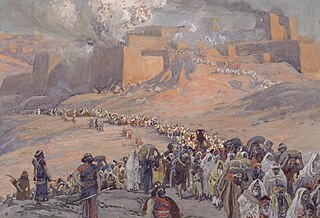
The Babylonian captivity or Babylonian exile was the period in Jewish history during which a large number of Judeans from the ancient Kingdom of Judah were forcibly relocated to Babylonia by the Neo-Babylonian Empire. The deportations occurred in multiple waves: After the siege of Jerusalem in 597 BCE, around 7,000 individuals were deported to Mesopotamia. Further deportations followed the destruction of Jerusalem and Solomon's Temple in 587 BCE.
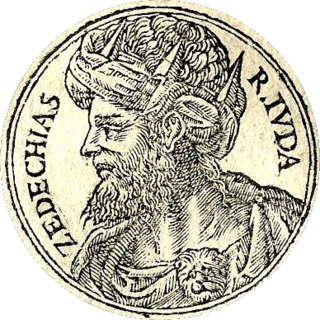
Zedekiah was the twentieth and final King of Judah before the destruction of Jerusalem by Nebuchadnezzar II of Babylon. His birth name was Mattaniah/Mattanyahu.

Jeconiah, also known as Coniah and as Jehoiachin, was the nineteenth and penultimate king of Judah who was dethroned by the King of Babylon, Nebuchadnezzar II in the 6th century BCE and was taken into captivity. He was the son and successor of King Jehoiakim, and the grandson of King Josiah. Most of what is known about Jeconiah is found in the Hebrew Bible. Records of Jeconiah's existence have been found in Iraq, such as the Jehoiachin's Rations Tablets. These tablets were excavated near the Ishtar Gate in Babylon and have been dated to c. 592 BCE. Written in cuneiform, they mention Jeconiah and his five sons as recipients of food rations in Babylon.
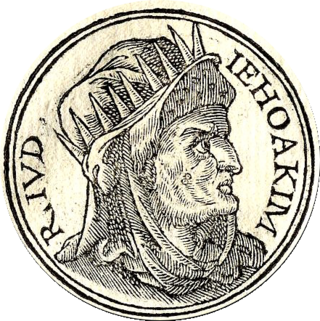
Jehoiakim, also sometimes spelled Jehoikim was the eighteenth and antepenultimate King of Judah from 609 to 598 BC. He was the second son of King Josiah and Zebidah, the daughter of Pedaiah of Rumah. His birth name was Eliakim.

The siege of Jerusalem was the final event of the Judahite revolts against Babylon, in which Nebuchadnezzar II, king of the Neo-Babylonian Empire, besieged Jerusalem, the capital city of the Kingdom of Judah. Jerusalem fell after a 30-month siege, following which the Babylonians systematically destroyed the city and Solomon's Temple. The Kingdom of Judah was dissolved and many of its inhabitants exiled to Babylon.
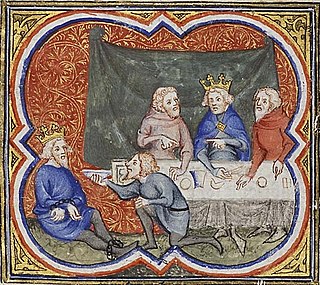
Judah's revolts against Babylon were attempts by the Kingdom of Judah to escape dominance by the Neo-Babylonian Empire. Resulting in a Babylonian victory and the destruction of the Kingdom of Judah, it marked the beginning of the prolonged hiatus in Jewish self-rule in Judaea until the Maccabean Revolt of the 2nd century BCE. Babylonian forces captured the capital city of Jerusalem and destroyed Solomon's Temple, completing the fall of Judah, an event which marked the beginning of the Babylonian captivity, a period in Jewish history in which a large number of Judeans were forcibly removed from Judah and resettled in Mesopotamia.

Jeremiah 52 is the fifty-second chapter of the Book of Jeremiah in the Hebrew Bible or the Old Testament of the Christian Bible. This book contains prophecies attributed to the prophet Jeremiah, and is one of the Books of the Prophets. This chapter contains a "historical appendix", matching the account in 2 Kings 24:18–25:30 of the end of national life in Judah, and also serving as a vindication of Jeremiah's message.

2 Kings 24 is the twenty-fourth chapter of the second part of the Books of Kings in the Hebrew Bible or the Second Book of Kings in the Old Testament of the Christian Bible. The book is a compilation of various annals recording the acts of the kings of Israel and Judah by a Deuteronomic compiler in the seventh century BCE, with a supplement added in the sixth century BCE. This chapter records the events during the reigns of Jehoiakim, Jehoiachin and Zedekiah, kings of Judah.

Jeremiah 29 is the twenty-ninth chapter of the Book of Jeremiah in the Hebrew Bible or the Old Testament of the Christian Bible. It is numbered as Jeremiah 36 in the Septuagint. This book compiles prophecies attributed to the prophet Jeremiah, and is one of the Books of the Prophets. This chapter records several "letters reported by the third-person narrator": from Jerusalem, Jeremiah sent a letter to the people in the Babylonia exile and he responded to a letter about him from Shemaiah.

1 Chronicles 3 is the third chapter of the Books of Chronicles in the Hebrew Bible or the First Book of Chronicles in the Old Testament of the Christian Bible. The book is compiled from older sources by an unknown person or group, designated by modern scholars as "the Chronicler", and had the final shape established in late fifth or 4th century BCE. This chapter contains the genealogy of unbroken Davidic line from the time of David to the post-exilic period, providing a possibility of the reinstatement of the Davidic monarchy in Jerusalem with its rightful heir, should circumstances allow. It is divided into three parts: (1) the sons of David ; (2) the kings in Jerusalem ; (3) the descendants during and after the exile period, verses 17–24. Together with chapters 2 and 4, it focuses on the descendants of Judah: chapter 2 deals with the tribes of Judah in general, chapter 3 lists the sons of David in particular and chapter 4 concerns the remaining families in the tribe of Judah and the tribe of Simeon. These chapters belong to the section focusing on the list of genealogies from Adam to the lists of the people returning from exile in Babylon.

Jeremiah 39 is the thirty-ninth chapter of the Book of Jeremiah in the Hebrew Bible or the Old Testament of the Christian Bible. It is numbered as Jeremiah 46 in the Septuagint. This book contains prophecies attributed to the prophet Jeremiah, and is one of the Books of the Prophets. This chapter is part of a narrative section consisting of chapters 37 to 44. Chapter 39 records the fall of Jerusalem, verses 1–10, and Jeremiah's fate, verses 11–18.

2 Kings 25 is the twenty-fifth and final chapter of the second part of the Books of Kings in the Hebrew Bible or the Second Book of Kings in the Old Testament of the Christian Bible. The book is a compilation of recorded acts of the kings of Israel and Judah by a Deuteronomic compiler in the seventh century BCE; a supplement was added in the sixth century BCE. This chapter records the events during the reign of Zedekiah, the last king of Judah, the fall of Jerusalem, the governorship of Gedaliah, and the release of Jehoiachin from prison in Babylon.

Ezekiel 19 is the nineteenth chapter of the Book of Ezekiel in the Hebrew Bible or the Old Testament of the Christian Bible. This book contains the prophecies attributed to the prophet/priest Ezekiel, and is one of the Books of the Prophets. This chapter contains a kinah or lamentation for the rulers of Israel. Two princes are lamented, one captured and carried to Egypt, i.e. Jehoahaz, son and successor of Josiah, and another carried to Babylon, who must be Jehoiachin.

2 Kings 23 is the twenty-third chapter of the second part of the Books of Kings in the Hebrew Bible or the Second Book of Kings in the Old Testament of the Christian Bible. The book is a compilation of various annals recording the acts of the kings of Israel and Judah by a Deuteronomic compiler in the seventh century BCE, with a supplement added in the sixth century BCE. This chapter records the events during the reign of Josiah, Jehoahaz and Jehoiakim, kings of Judah.

Jeremiah 22 is the twenty-second chapter of the Book of Jeremiah in the Hebrew Bible or the Old Testament of the Christian Bible. This book contains prophecies attributed to the prophet Jeremiah, and is one of the Books of the Prophets.

Jeremiah 36 is the thirty-sixth chapter of the Book of Jeremiah in the Hebrew Bible or the Old Testament of the Christian Bible. It is numbered as Jeremiah 43 in the Septuagint. This book contains prophecies attributed to the prophet Jeremiah, and is one of the Books of the Prophets. This chapter records the burning of a scroll of Jeremiah's prophecy by King Jehoiakim and the creation of another scroll by Baruch the scribe, acting on Jeremiah's instructions.
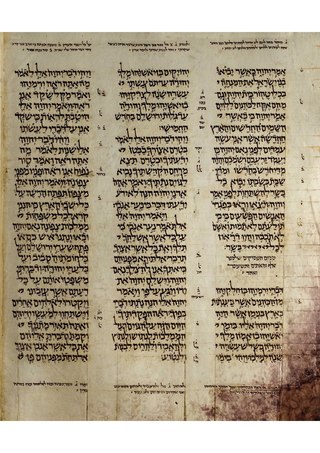
Jeremiah 27 is the twenty-seventh chapter of the Book of Jeremiah in the Hebrew Bible or the Old Testament of the Christian Bible. The material found in Jeremiah 27 is found in Jeremiah 34 in the Septuagint, which orders some material differently. This book contains prophecies attributed to the prophet Jeremiah, and is one of the Books of the Prophets. The New American Bible (NABRE) describes chapters 27-29 as "a special collection of Jeremiah’s prophecies dealing with false prophets", and suggests that "stylistic peculiarities evident in the Hebrew suggest that these three chapters once existed as an independent work".

Jeremiah 28 is the twenty-eighth chapter of the Book of Jeremiah in the Hebrew Bible or the Old Testament of the Christian Bible. The material found in Jeremiah 28 of the Hebrew Bible appears in Jeremiah 35 in the Septuagint. This book contains prophecies attributed to the prophet Jeremiah, and is one of the Books of the Prophets. This chapter contains a confrontation between prophets Jeremiah and Hananiah: Hananiah's false prophecy is responded by Jeremiah's answer, Jeremiah 28:1-9. Hananiah breaks Jeremiah's yoke, Jeremiah foretells an iron yoke, and Hananiah's death, Jeremiah 28:10-17.

Jeremiah 35 is the thirty-fifth chapter of the Book of Jeremiah in the Hebrew Bible or the Old Testament of the Christian Bible. It is numbered as Jeremiah 42 in the Septuagint. This book contains prophecies attributed to the prophet Jeremiah, and is one of the Books of the Prophets. This chapter records the meeting of Jeremiah with the Rechabites, a nomadic clan, in which the prophet "contrast[s] their faithfulness to the commands of a dead ancestor with the faithlessness of the people of Judah to the commands of a living God".

Jeremiah 37 is the thirty-seventh chapter of the Book of Jeremiah in the Hebrew Bible or the Old Testament of the Christian Bible. It is numbered as Jeremiah 44 in the Septuagint. This book contains prophecies attributed to the prophet Jeremiah, and is one of the Books of the Prophets. This chapter is the start of a narrative section consisting of chapters 37 to 44. Chapter 37 records King Zedekiah's request for prayer, Jeremiah's reply to the king, and Jeremiah's arrest and imprisonment.












